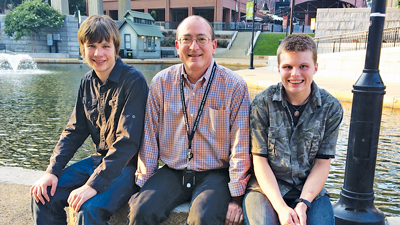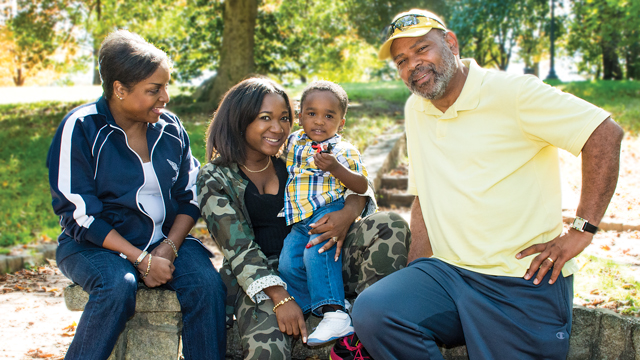“There can be no keener revelation of a society’s soul
than the way in which it treats its children.”
–Nelson Mandela
Janeva Smith was nineteen and living in a car with her newborn baby. Terrified social services would take her child if the agency knew about her circumstances, she did not apply for help. How did she wind up that way? It was the same path hundreds of Virginia children who have come through the foster care system travel each year.
One of six children removed from their mother due to neglect, Janeva was only eighteen months old when she was placed in foster care. In the process, she lost contact with all of her siblings except one sister, and was consequently moved to eleven different foster homes, shelters, and temporary residences. She had run away on several occasions and considered suicide on others. Finally, at eighteen, she opted out of the system, hoping she could build a more stable, happier life on her own.
She got a job and was given a stipend by social services with the conditions that she remain employed, continue her education, and attend counseling sessions. But then it all fell apart.
Each year, 700 children age out of the foster care system in Virginia. Once these children turn eighteen, they can choose whether they stay in the system another three years until age twenty-one. But most opt out because they are frustrated with the system, are unhappy with their foster care placement, or, like Janeva, they believe they can make a better life for themselves independently. Most of these kids don’t have a stable educational past, life skills, a realistic way to pay for rent and utilities, or any support system in place.
“It was the loneliness that got to me. I felt totally alone,” says Janeva. “I had no one to spend holidays with, no one to call when I was sick. I didn’t know how to do anything even as simple as applying for a driver’s license or handling a bank account. I became involved with the wrong people and then I got pregnant.” Janeva became ill with pregnancy complications and was advised to stay off her feet as often as possible. She lost her job. Because this violated her arrangement with the government agency, she became ineligible for her stipend. She gave birth with little help from the child’s father. Later, she was evicted from her apartment with a new baby in her arms. She begged for places to stay with the few friends she had, and finally, wound up on the doorstep of her boyfriend’s mother, who did take her in. But, Janeva says, that house was too crowded and when tempers flared, she was told to leave. With her baby in tow, she slept where she could, often spending the night in her car. She says, “I love this child. He is my own baby and I would do anything to keep him safe and with me. I was afraid social services would take him if they knew how I was living.” So, she dealt with it all, as best she could. Alone.
Janeva’s story is a sad one, and it’s typical. Foster children who age out of foster care frequently wind up homeless. They might be jailed for petty crimes and incarcerated with older and more experienced criminals; some become prostitutes or victims of abusive predators. The sad irony is these kids often suffer more serious abuse than they experienced before being placed into foster care. This estimate from the National Center for Missing and Exploited Children says a lot: Sixty-three percent of teens who wind up as human trafficking victims had been in the care of social services. Nationally, statistics show that of the children who age out of foster care, more than one in five become homeless, less than eighty percent will graduate from high school, and one in four will be involved with the justice system within two years of leaving foster care.
Here in Richmond, Janeva’s story took a positive turn when a former social worker heard about Janeva’s situation and got in touch with her. Charlene White is the program manager for Virginia One Church, One Child, a statewide adoption education and recruitment program. Charlene got to know Janeva through her contacts at the Children’s Home Society. “Janeva always had a special place in my heart.” But when they first met, Charlene had already adopted two young girls and didn’t have room in her home for another child. Over the years she had intermittent contact with Janeva. When she reconnected with her, Janeva had just had a baby and was living on the street. By then, Charlene had the space to welcome Janeva and her child. “Yes, I became a mother and a grandmother at the same time. My husband and I just love Tra’ Shawn,” she says, adding that the little boy calls her husband Pop-Pop.
Janeva says Charlene has been a mother to her and to her son. “She bought me food, clothes for the baby, helped me care for him, and took care of me when I was sick,” Janeva says. “When you are a child in the foster care system, you are constantly moving. You come to believe that you are just not good enough or important enough for one person to keep you – for one person to say ‘I will always love you.’” Having someone like that means more than anything to Janeva, who adds, “I have family now, real family that cares about me.”
Finding Forever Families for Older Children
There are approximately 5,000 children in foster care in Virginia. Virginia ranks first among states in the percentage of youth (25 percent) who age out of foster care without being adopted. Statistics show that each year, at least 700 children will not be adopted. While all children in foster care have suffered emotional trauma and loss, those who are not adopted may face the hardest road yet when they turn eighteen and exit the system without having found a family.
Most people looking to build a family through adoption think of opening their homes to infants or young children, but there are many reasons to consider adopting an older child. Steven Effinger of Richmond will tell you it is a life-changing and beautiful experience. Divorced and in his fifties, he was watching a television show on mentoring teenage boys. The program moved him emotionally as he had grown up without a father. He says, “I had a mom and grandparents and they were great, but I know what it’s like to have no father figure in your life.”

Steven joined the program, Boys to Men, and over a 3-year period mentored several middle school-aged boys. During this time, he got to meet many at-risk teens who had little or no family support system. “With no one to help them, these kids wind up on the street when they age out of foster care,” Steven says. “I can tell you that at age eighteen, I was in no way able to go out on my own. I wanted to help somehow.”
The process for adoption is very thorough. It’s designed to make each adoption successful for both parent and child. Nadine Marsh-Carter, director of the Children’s Home Society says when you adopt through an agency like CHS, you and your child will continue to receive support from the agency to assist you as you develop this new relationship. Marsh-Carter says the program is designed to assure interested adoptive parents they will not be alone in this endeavor. There is no charge for the orientation, training, counseling, and support and it is offered on an ongoing basis that extends years
after the adoption.
“There are many children in foster care now that would give anything to have that connection. When you adopt a child, no matter his or her age, you have a chance to shape their lives forever,” says Nadine.
Steven Effenger was made aware of the adoption process for older children during a state-wide Virginia Adopts campaign. A representative from the Children’s Home Society told him they thought they had a match for him: two boys, Richard, eighteen, and Jeffrey, sixteen. Over a year’s time, they got to know each other and Steven went through adoption pre-processing and training. The boys and Steven have lived together now for a year. “We had some ups and downs at first. These kids who have been abused and neglected will test you to see if you are going to keep them and if you really love them. I’ve had to change my life, be less selfish, put their needs ahead of mine but I cannot put a price on this. I am divorced and fifty-nine years old, so I was running out of time to do something like this. It’s an unusual way to develop a family, but I’m so glad I did.”
Earlier this month, Effinger visited Washington, DC, where he received an Adoption Excellence Award from the U.S. Department of Health and Human Services for extraordinary contributions in providing adoption and other successful outcomes for children in foster care. He is one of ten national recipients of this annual award.
While it’s true that adopting a child in his or her teens means you miss out on the experience of middle-of-the-night feedings and potty training, you could be the first person to ask a child to help prepare Thanksgiving dinner or decorate a Christmas tree. You could give a child a birthday party for the first time, or let him have a sleepover in a safe and welcoming environment. You could also watch proudly as your adopted child graduates from high school, gets her first job, or like Charlene White, become a mother and grandmother in one step.
“None of us are ever too old to need parents and family,” says Charlene. “With older children, they are about to make some of the most important decisions in their lives – school, careers, having their own children.” She points out that it’s not just this generation you are influencing, it’s the next one as well. “Today is Janeva’s twenty-third birthday. We will celebrate that with her, introduce her to our traditions. Nurturing children is a lifetime process. Adoption does not end at age eighteen.”
We all can agree that family doesn’t either.
How Can You Help?
Open your mind and heart to adoption.
For information and resources on adoption of both infants and children, contact the Children’s Home Society, 804-353-0181 or one of the many adoption agencies in the Richmond area.
Back legislation to extend support for foster care children who age out.
Half of states have passed bills adopting a federally funded program (the Foster Care Child Continuation Act of 2006) that extends foster care support to children who have aged out of foster care. In Virginia, this bill was passed by the Senate but stripped of all funding by the House. It will be refiled again in 2016. This bill would prevent many children who have already suffered considerable trauma from winding up on the streets, homeless, in jail, or in abusive situations. It will offer them support and/or financial aid to help them transition from a life in the social services system to becoming independent adults.
To find out how you can lend support to the passage of this bill (SB 967), contact Amy Woolard, senior policy attorney at Virginia Voices for Children at amy@vakids.org or visit jimcaseyyouth.org.




